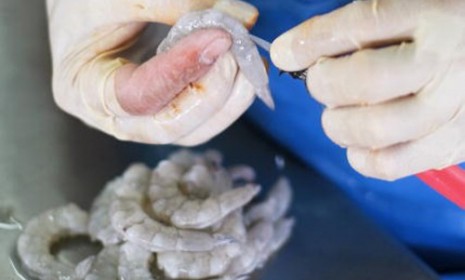What is a BP spill 'seafood sniffer'?
To keep oil-tainted seafood off our plates, the government is using the "smell test." That will keep us safe?

A free daily email with the biggest news stories of the day – and the best features from TheWeek.com
You are now subscribed
Your newsletter sign-up was successful
Nobody wants oil-tainted seafood from the Gulf of Mexico to reach the dinner table — not consumers, not BP, not federal and state officials, and certainly not the people whose livelihood depends on the Gulf's seafood industry. But to keep oily fish, shrimp, oysters, and other seafood out of restaurants and markets, regulators are relying on a very old tool: the human nose. Here's a guide to the re-energized art of "seafood sniffing":
What do seafood sniffers do?
Pretty much what you'd expect. The National Oceanic and Atmospheric Administration (NOAA) and the nonprofit International Food Protection Training Institute (IFPTI) are teaching Gulf state officials to detect oil contamination by smelling batches of locally caught seafood. (See the sniffers at work)
The Week
Escape your echo chamber. Get the facts behind the news, plus analysis from multiple perspectives.

Sign up for The Week's Free Newsletters
From our morning news briefing to a weekly Good News Newsletter, get the best of The Week delivered directly to your inbox.
From our morning news briefing to a weekly Good News Newsletter, get the best of The Week delivered directly to your inbox.
How do you learn to do that?
Trainee sniffers start by smelling "different samples of oil to sort of train our noses and minds to recognize it," says William Mahan, a University of Florida agricultural extensionist who underwent the NOAA training. Then they do blind sniffings of shrimp, oysters, and finfish with different levels of oil contamination. It's important "to just go by the smell," not sight, says IFPTI's Joan Bowman, "because oil can be washed off or masked with something else."
The "smell test" works? Really?
NOAA, the FDA, and state labs are also doing chemical analyses on thousands of seafood specimens, but the sniff test is "the gold standard" in detecting tainted seafood, says Tulane University toxicologist LuAnn White. "Properly trained noses are really remarkable organs," says NOAA's Brian Gorman, noting that noses have been used for centuries to help make wine, butter, and cheese. Sniffing is also faster, by several days, and cheaper than lab tests.
A free daily email with the biggest news stories of the day – and the best features from TheWeek.com
What does oil-tainted seafood smell like?
"It smells just like you'd expect, like oil," says IFPTI's Bowman. "And sometimes it has a gas smell to it." Mahan adds: "Everybody's nose works differently. For me, the oysters are a little more challenging."
Are there enough sniffers to keep us safe?
Not 100 percent, but sniffers are a second line of defense, after the closing of a third of federal and state Gulf waters (so far) to fishing.
What if you eat oiled seafood that slipped through the safety net?
It wouldn't be as bad as you think, says White. You might get a stomach ache, but the oil actually isn't highly toxic, and sea creatures quickly metabolize it. Based on post–oil spill studies of oysters and mussels in Washington and Texas, she adds, you'd have to eat "tons" of seafood for decades to be harmed. Not everyone's convinced. "I ain't eating any of it," says Mississippi gas worker Mike Triana. "I don't trust the nose."
Sources: AP, Slash/food, USA Today, Dallas Morning News, NOAA (pdf)